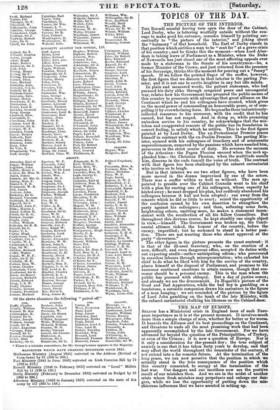TOPICS OF THE DAY.
THE PICTURE OF THE INTERIOR.
THE Russell scandal having torn open the door of the Cabinet, Lord Derby, who is loitering wistfully outside without the cou- rage to make good his entrance, consoles himself liy pointing sar- castically to " the picture of the interior," and joking about the " harmony " of that household. The Earl of Derby stands in that position whichentitles a man to be " sent for" at a grave crisis of his country; and he thinks this the moment—when Lord Aber- deen is taking leave of Parliament as a Minister, when the Duke of Newcastle has just closed one of the most affecting appeals ever made by a statesman to the Senate of his countrymen—he, a former Minister of the Crown, and just returned from the presence of his Sovereign, thinks this the moment for pouring out a "funny" speech. If we follow the pointed finger of the scoffer, however, the first figure that we discern in that interior is the parting Pre- mier, and it is not one to excite laughter in any but idle minds.
In plain and measured words, the patient statesman, who had pursued his duty alike through congenial peace and uncongenial war, relates how his Government has prepared the public means of this country to prosecute with advantage that great alliance on the Continent which he and his colleagues have created, which gives us the moral power of commanding an honourable peace, or of com- pelling it by overwhelming force. He bequeaths those industriously- collected resources to his successor, with the credit that he has earned, but has not reaped. And in doing so, while promising unbroken service to his country, he acknowledges that the mis- taken and exaggerated censure of the public has its foundation in correct feeling, to satisfy which he retires. This is the first figure pointed at by Lord Derby. The ex-Protectionist Premier places himself in contrast with the ex-Peelite Premier. The parting Min- ister, accused with his colleagues of treachery and of aristocratic superciliousness, unmoved by the passions which have assailed him, perseveres in the strict course of duty. He reverses the sarcasm of the Athenian : the Pagan Phocion sneered when the mob ap- plauded him— the Christian Phocion, when the multitude assails him, discerns in the rude tumult the voice of truth. The contrast with that figure has been challenged by the cabaret caricaturist who invites us to laugh. But in that interior we see two other figures, who have been more moved in the drama improvised by one of the adorn. There was a scoffer within as well as without. The man ap- pointed to preside over the Cabinet Councils went to his chief with a plan for ousting one of his colleagues, whose capacity he hinted away; he next dropped his plan, but suddenly abandoned his colleagues because it had not been adopted ; ran away from the censure which he did so little to avert; seized the opportunity of the confusion caused by his own desertion to strengthen the party against his colleagues ; and then, softening some facts, heightening others, omitting more, he makes a statement incon- sistent with the recollection of all his fellow gouncillors. But throughout this devious course, he kept steadily one single object in view,—himself. The Government was broken up, the Conti- nental alliance risked, the honour of the country, before the enemy, imperilled; but he reckoned to stand in a better posi- tion. There are not wanting those who shout approval at the party " cleverness." The other figure in the picture presents the exact contrast: it is that of the ill-used Secretary, who, on the creation of a new, difficult, and even dangerous office, accepted its duties with- out expecting credit—rather anticipating odium; who persevered in ceaseless labours through misrepresentation; who exhorted his chief to do what he liked with him for the service of the country, places himself at the disposal of Parliament, and promises to his successor continued exertions to attain success, though that suc- cessor should be a personal enemy. This is the man whom flit public has pursued with obloquy. But a day of justice comes; and already we see the denouement. In Hogarth's picture of the Good and Bad Apprentices, while the bad boy is gambling on a tombstone, a sarcastic companion draws his caricature in the figure of a man hanging: we are reminded of the picture by the figure of Lord john gambling on the tomb of the late Ministry, with the cabaret caricaturist chalking his likeness on the Cabinet-door.


























 Previous page
Previous page